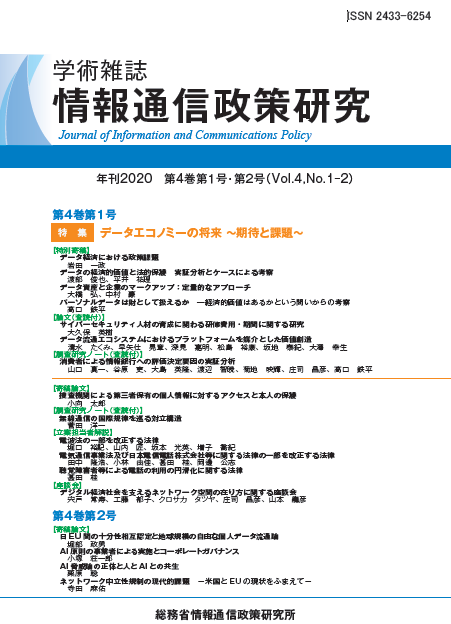Volume 4, Issue 1
Displaying 1-13 of 13 articles from this issue
- |<
- <
- 1
- >
- >|
-
2020Volume 4Issue 1 Pages 1-18
Published: December 01, 2020
Released on J-STAGE: January 07, 2021
Download PDF (998K) Full view HTML -
2020Volume 4Issue 1 Pages 19-31
Published: December 01, 2020
Released on J-STAGE: January 07, 2021
Download PDF (1166K) Full view HTML -
2020Volume 4Issue 1 Pages 33-46
Published: December 01, 2020
Released on J-STAGE: January 07, 2021
Download PDF (1057K) Full view HTML -
2020Volume 4Issue 1 Pages 47-61
Published: December 01, 2020
Released on J-STAGE: January 07, 2021
Download PDF (887K) Full view HTML
-
2020Volume 4Issue 1 Pages 81-101
Published: December 01, 2020
Released on J-STAGE: January 07, 2021
Download PDF (1526K) Full view HTML -
2020Volume 4Issue 1 Pages 103-123
Published: December 01, 2020
Released on J-STAGE: January 07, 2021
Download PDF (2190K) Full view HTML
-
2020Volume 4Issue 1 Pages 125-144
Published: December 01, 2020
Released on J-STAGE: January 07, 2021
Download PDF (2292K) Full view HTML
-
2020Volume 4Issue 1 Pages 63-80
Published: December 01, 2020
Released on J-STAGE: January 07, 2021
Download PDF (2045K) Full view HTML
-
2020Volume 4Issue 1 Pages 145-158
Published: December 01, 2020
Released on J-STAGE: January 07, 2021
Download PDF (3210K) Full view HTML
-
2020Volume 4Issue 1 Pages 159-173
Published: December 01, 2020
Released on J-STAGE: January 07, 2021
Download PDF (4757K) Full view HTML -
2020Volume 4Issue 1 Pages 175-185
Published: December 01, 2020
Released on J-STAGE: January 07, 2021
Download PDF (2950K) Full view HTML -
2020Volume 4Issue 1 Pages 187-200
Published: December 01, 2020
Released on J-STAGE: January 07, 2021
Download PDF (6749K) Full view HTML
-
2020Volume 4Issue 1 Pages 201-224
Published: December 01, 2020
Released on J-STAGE: January 07, 2021
Download PDF (2668K) Full view HTML
- |<
- <
- 1
- >
- >|
